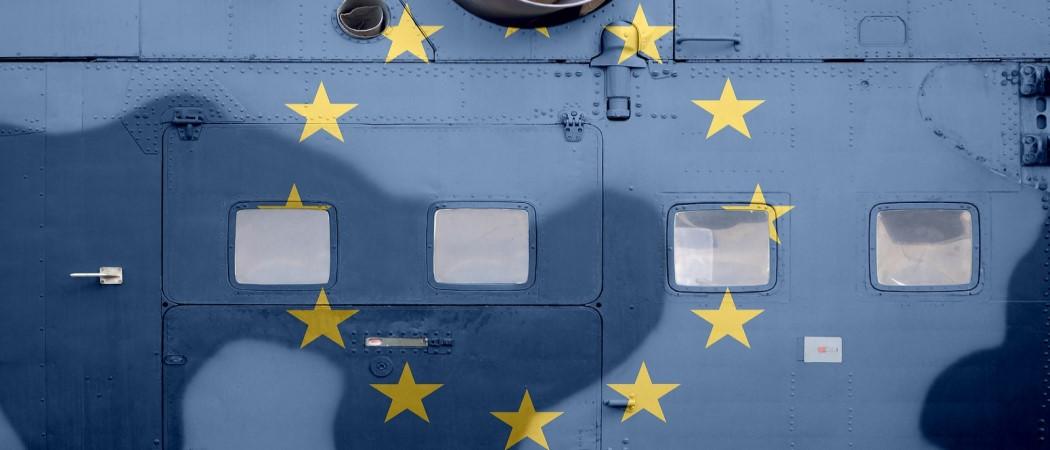The money will make the EU third biggest investor in defence research in Europe and give it firepower to reduce the longstanding reliance on US military technology

MEPs and the German presidency of the EU Council reached agreement on a new defence R&D programme worth €7.9 billion on Monday, giving the EU more firepower to reduce a longstanding reliance on US military technology.
As of next year, the fund will place the EU among the top three defence research and technology investors in Europe, with the European Commission starting implementation of the programme in January 2021.
The European Defence Fund is the first EU programme to finance common defence-related R&D projects. It builds on previous work by the Preparatory Action on Defence Research programme launched in 2017 with a budget of €90 million for two years, followed by the European Defence Industrial Programme with a budget of €500 million for 2019 and 2020.
The new defence fund is part of a broader strategy by the EU to flex its geopolitical influence in the world and to cover gaps in EU’s defence system left uncovered by the US, as the outgoing administration of president Donald Trump has disengaged from the North Atlantic Treaty Organisation (NATO) and pressured EU member states to increase their defence budgets to 2% of their GDP. Very few countries have achieved this target.
Trump’s demands for European countries to contribute more funding and resources to NATO led Germany’s chancellor Angela Merkel and French president Emmanuel Macron to call for the establishment of a European army to complement NATO.
“Through defence cooperation and joint investment in R&D, the European Defence Fund will deliver state of the art and interoperable defence technologies and equipment in line with member states capability needs,” said Thierry Breton, EU commissioner for the internal market.
“From now on, we want to pull our resources together in order to increase quality of defence technologies produced by the European defence sector, while reducing their cost,” said the European Parliament’s rapporteur on the file, Polish MEP Zdzisław Krasnodębski.
According to the agreement, the fund will also take into account priorities set by member states within joint projects with other regional and international organisations such as NATO.
“The fund will complement member states’ defence spending efforts and should thus be perceived as part of a broader answer to the justified demands from our allies,” said Krasnodębski.
The idea for the defence fund was first floated in 2016, by former president of the Commission Jean-Claude Juncker. At the time, the Commission estimated that the lack of cooperation between EU member states in the field of security and defence costs between €25 billion and €100 billion per year.
MEPs and EU ambassadors sitting in the Permanent Representatives Committee will formally approve the launch of the programme after the Parliament votes on the EU’s next multiannual budget on Wednesday.
Changing geopolitical context
The EU’s geopolitical context has changed dramatically over the past few years, as the US has cut back on its involvement in military alliances established during the Cold War and after the fall of the communist regimes in eastern Europe.
This retreat prompted the EU to reconsider its geopolitical strategy and set out to revive its defence R&D. The defence industry is fragmented into national markets, most with a single buyer, meaning member states are duplicating resources.
According to the Commission, R&D defence budgets have seen significant cuts in several member states in the past decade. At the same time, the cost of defence equipment and R&D has gone up, while research cooperation between EU member states has remained limited.
How will it work
Over the next seven years, the defence fund will cover research and development projects jointly agreed by member states that are in line with EU’s defence priorities. MEPs hope the money invested in defence R&D will also help industry weather the economic crisis caused by the COVID-19 pandemic.
“This progress should benefit not only member states’ armed forces, but also their industries, which desperately need every possible stimulus helping them to properly recover from the consequences of the COVID-19 pandemic,” Krasnodębski said.
The fund will finance collaborative projects in which at least three participants from three member states are building common prototypes and promote cross-border activities of small and medium sized enterprises.
“[The fund] will eventually have a lasting positive impact on industry and employment by supporting European value chains in the fields of security and defence and by investing in long-term research and development,” said MEP François-Xavier Bellamy.
Defence and space giants like Airbus and Thales have shown their interest in the programme, but it remains difficult to convince academia and small and medium sized companies to collaborate in defence projects.
The fund will dedicate up to 8% of its budget to disruptive technologies. An additional 10% will be dedicated to projects developed within the framework of the Permanent Structured Cooperation, a group of 25 EU member states working closely on a plan to coordinate their armed forces.
In addition, the fund should contribute to reduce duplication and strengthen interoperability of the defence systems used by European armed forces.





 A unique international forum for public research organisations and companies to connect their external engagement with strategic interests around their R&D system.
A unique international forum for public research organisations and companies to connect their external engagement with strategic interests around their R&D system.